NB: Many of the listed works are also available at other bookstores.
Some are only in print, others are both in print and as PDF online.
ʿAbd Allah b. ʿUmar b. Muhammad b. ʿAli al-Baydawi
The Lights of Revelation & the Secrets of Interpretation
Transl. and notes by Sh. Gibril Fouad Haddad (bilingual)
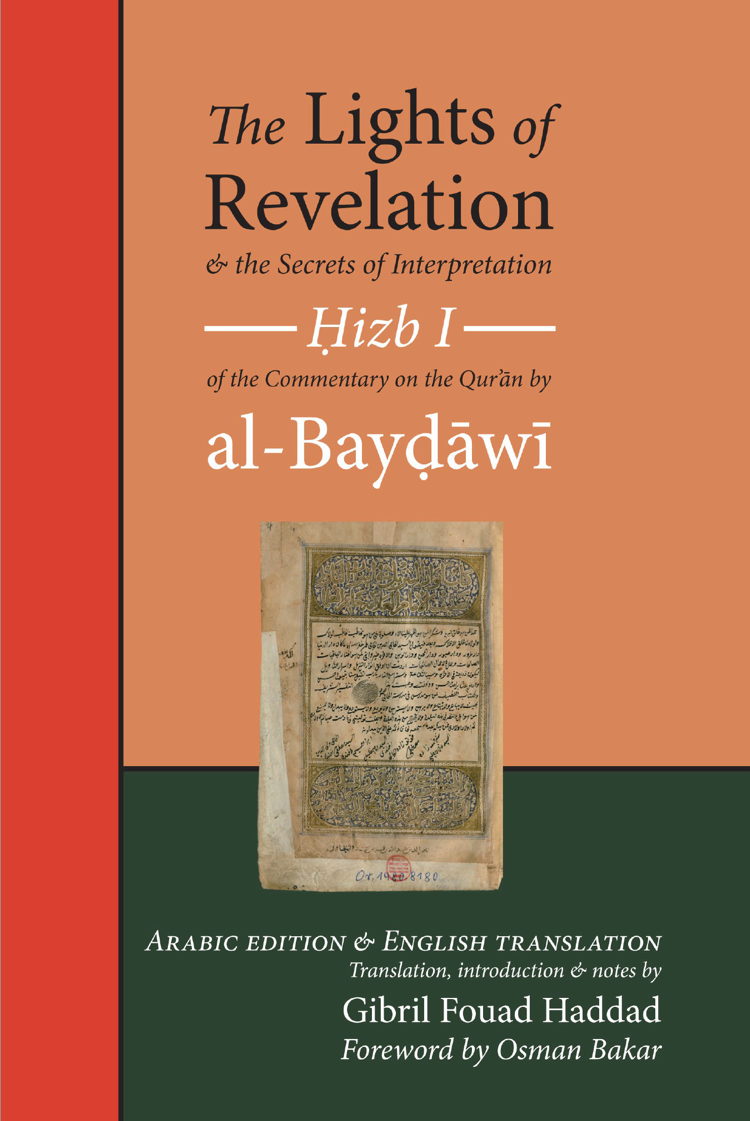
NB: This edition and translation of Hizb I is a self-contained project, brought to a close.
However, there is a separate project consisting in the integral English translation (no edition) of the complete Tafsir al-Baydawi which is ongoing. (upd. 2023-04-14)
More info … [+]
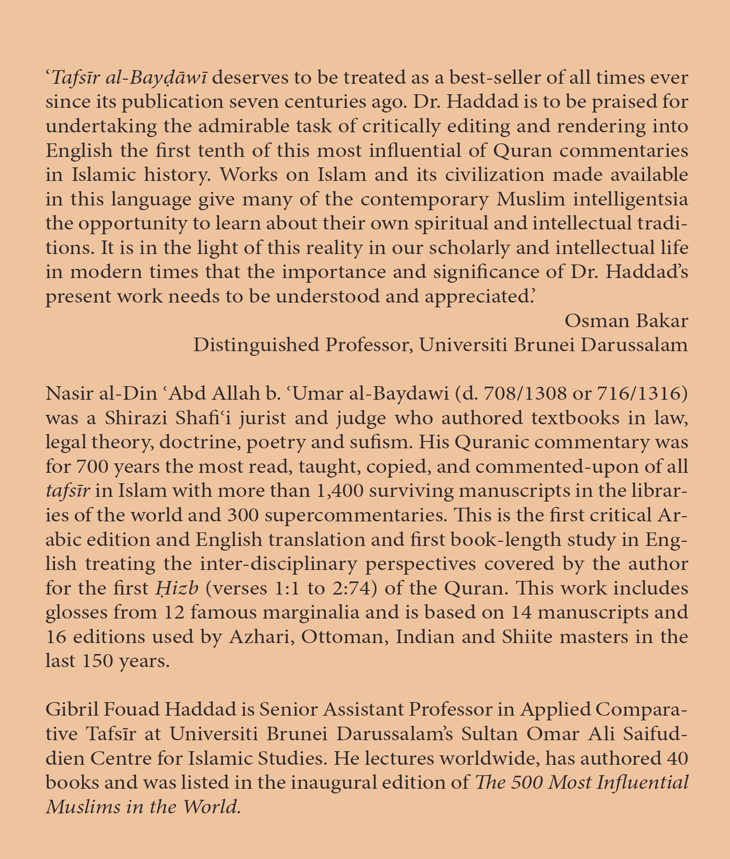
This single volume contains the Arabic edition, English translation and notes by Dr. Gibril Fouad Haddad of ʿAbd Allah b. ʿUmar b. Muhammad b. ʿAli al-Baydawi’s first juz of Anwar al-Tanzil wa-Asrar al-Taʾwil (The Lights of Revelation and the Secrets of Interpretation).
As a revised and improved version of al-Zamakhshari’s landmark Tafsir al-Kashshaf, Anwar al-Tanzil contains the most concise analysis of
the Quranic use of Arabic grammar and style to date and was viewed early on as a foremost demonstration of the Qurʾan’s essential and
structural inimitability (iʿjaz maʿnawi wa-lughawi) in Sunni literature.
Anwar al-Tanzil is important and significant, because of its fame and influence. In Dr. Haddad’s own estimation, this work “became and
remained for seven centuries the most studied of all Tafsirs,” and it is to be regarded as “the most important commentary on the Quran in
the history of Islam.”
Related
 Hamad T Award
Hamad T Award
فئة الترجمة من اللغة العربية إلى اللغة الإنكليزية
المركز الثاني: جبرائيل فؤاد حداد
عن ترجمة أنوار التنزيل في أسرار التأويل للبيضاوي
Encyclopedia of Hadith Forgeries
by Mulla ‘Ali al-Qari: Sayings Misattributed to the Prophet Muhammad ﷺ
Transl. and expanded by Gibril Fouad Haddad, 2013
Introduction, Translation and Notes (740 pages including seven indexes).
 PDF Encyclopedia Of Hadith Forgeries
PDF Encyclopedia Of Hadith Forgeries
More info … [+]
The Lifting of Secrets Concerning Forged Reports (الأسرار المرفوعة في الأخبار الموضوعة) was written over four hundred years ago by a respected and prolific Meccan savant of Afghan origin. Mulla ‛Ali al-Qari (d. 1014/1605) was thoroughly familiar with the large body of critical literature on hadith forgery, which he refined and reordered alphabetically into 625 entries. Al-Qari’s last work, it is the only catalogue of forgeries with both a transmission-based and content-based critique, illustrating the author’s vast erudition as well as his lenient choices in hadith methodology and his classic Hanafi and Sufi views.
The translator has added his own study of the forgery and “famous hadith” genres, a bio-bibliography of the author, extensive footnotes and exhaustive indices. A total of 3,000 reports are documented in this volume covering doctrinal and juridical forgeries, Shiite forgeries, Sufi forgeries, racial forgeries, misogynistic forgeries, food forgeries, “Israelite” forgeries, medical forgeries, sex forgeries, spurious books, spurious grave-spots and more. This is the first and long overdue authentic reference work on hadith forgeries in English.
Dr. Gibril Fouad Haddad holds scholarly licenses (ijāza) from 150 shaykhs and has authored dozens of books and hundreds of articles in Islamic hermeneutics, doctrine, hadith, biography and heresiology. He was hailed in the inaugural edition of The 500 Most Influential Muslims in the World as one of the clearest voices of traditional Islam in the West. His works include The Four Imams and Their Schools, Sunna Notes I-III, The Muhammadan Light in the Qur’an, Sunna and Companion-Reports, and The Maturidi School.
Albani and His Friends: A Concise Guide to the "Salafi" Movement
2nd edition (Out of Stock 2022)
by Gibril Fouad Haddad, 2009
 PDF Albani And His Friends
PDF Albani And His Friends
More info … [+]
Topics: Wahhabism, Salafism, Islamic heresies, Islam-related extremism, Islam-related purism, Islam-related modernism, Islam-related materialism, Sunni critique of Wahhabism
An alphabetical guide to fifteen of the main figures of contemporary Wahhabism with excerpts from their own statements and those of their critics.
Mawlid: Celebrating the Birth of the Holy Prophet ﷺ
upon him blessings and peace
by Gibril Fouad Haddad, 2002
 PDF Mawlid: Celebrating the Birth of the Holy Prophet
PDF Mawlid: Celebrating the Birth of the Holy Prophet
More info … [+]
Topics: Mawlid, Maulud, Milad-e-Nabi, Muslim polemics, Taqi Usmani, innovation in Islam, bid'a
A synopsis of the legal ruling of permissibility for celebrating the birth of the Prophet Muhammad (upon him blessings and peace) as established by the vast majority of Sunni scholars in refutation of fringe groups (Wahhabis and Deobandis) who claim it is impermissible.
Also a refutation of an anti-mawlid fatwa by Mufti Muhammad Taqi Usmani
Al-Maliki, Muhammad ibn ʿAlawi
The Prophet's Night Journey and Heavenly Ascent
4th edition, transl. by Gibril Fouad Haddad, 1999
 PDF The Prophet's Night Journey and Heavenly Ascent
PDF The Prophet's Night Journey and Heavenly Ascent
More info … [+]
This is the fourth edition of the complete English translation by Gibril Fouad Haddad of al-Anwār al-Bahiyya min Isrā’ wa-Mi‘rāj Khayr al-Bariyya, “The Resplendent Lights of the Night-Journey and Ascension of the Best of Creation [the Prophet Muhammad],” which he gifted in person -- at the time of his 1999 Hajj pilgrimage -- to the original author in his home and school in the Rusayfa district of Mecca, the beloved and distinguished late Sunni and Sufi educator Shaykh Muhammad b. Alawi al-Malaki al-Hasani (1367-1425/1948-2004).
Shaykh Muhammad b. Alawi said he had written it "as a separate monograph so as to allow its access to the people at large. In this way they can familiarize themselves with that text and recite it in the public meetings and great celebrations in which Muslims gather to commemorate al-Isrā’ wal-Mi‘rāj, as is the custom in many countries, especially in the two Holy Sanctuaries." He added that the book includes most of the different Hadith narrations on this subject and he prefaced it with the words:
"Praise be to Allah Who chose His praiseworthy servant Muhammad for the Message, distinguished him with the night journey on the lightning-mount Buraq, and caused him to ascend the ladders of perfection to the high heavens to show him of the greatest signs of his Lord. He raised him until he reached the Lote-tree of the Farthest Boundary where ends the science of every Messenger-Prophet and every Angel Brought Near, where lies the Garden of Retreat, to the point that he heard the sound of the pens that write what has befallen and what is to befall..."
Ibn Jahbal
The Refutation of Him [ibn Taymiyyah] Who Attributes Direction to Allah
Transl. and notes by Sh. Gibril Fouad Haddad
 PDF The Refutation of Him Who Attributes Direction to Allah
PDF The Refutation of Him Who Attributes Direction to Allah
More info … [+]

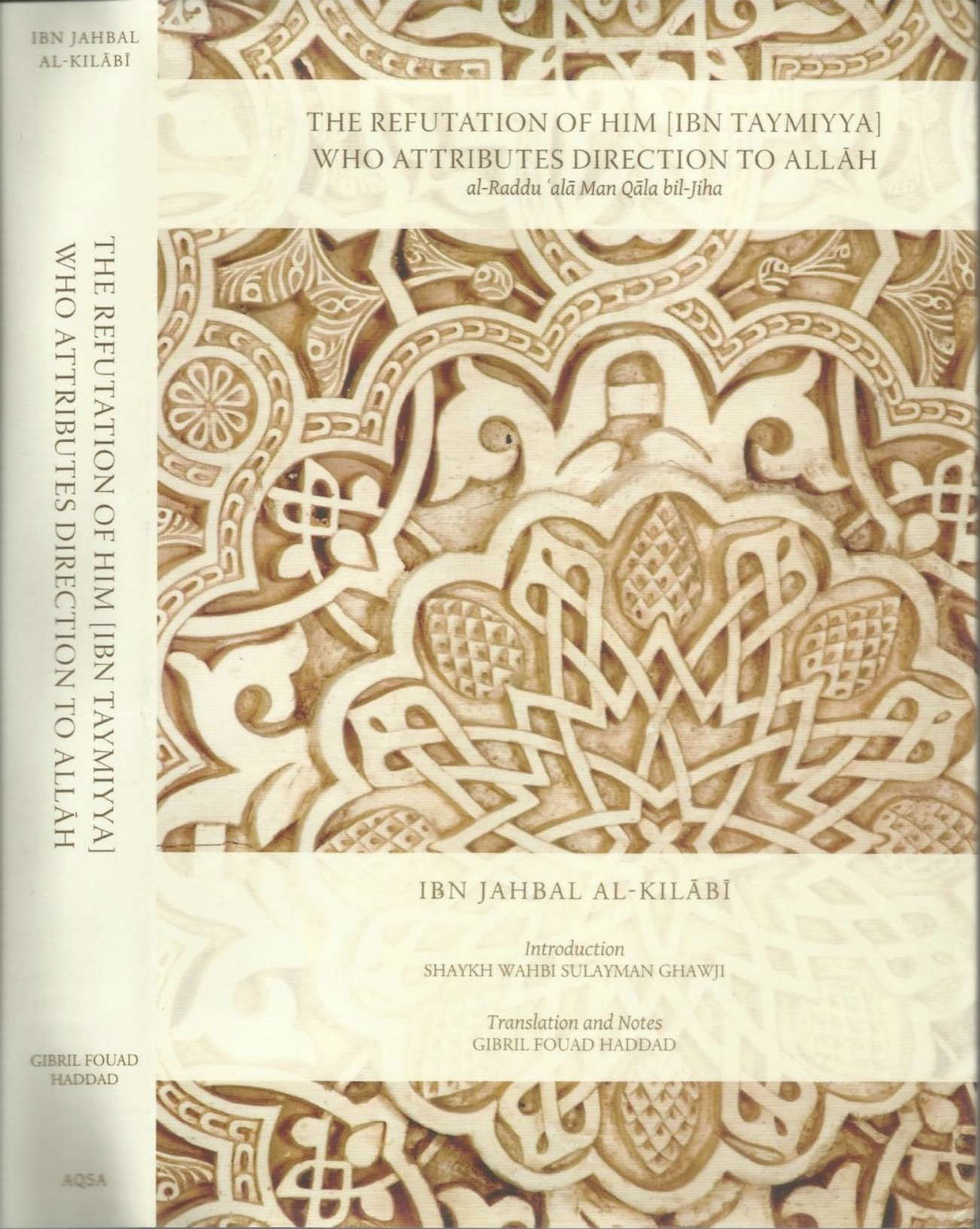
Topics: Islam, Sunni, Creed
A refutation of ibn Taymiyyah on a point that he erred, and unfortunately the salafi sect followed him in.
This short theological tract,
Fi Nafi al-Jiha, or On Denying Direction to God, by the Ashari theologian and celebrated Shafi'i jurist, Qadi Ibn Jahbal (d. 733/1333), is a clinical rebuttal of the controversial fatwa, the Aqida Hamawiyya, penned by his legendary contemporary, Ibn Taymiyya (d. 728/1328).
It is considered, rightly, a classic manifesto of anti-literalism, which will be an indispensable reference for advanced students of Islamic theology, other professional theologians, and modern academics needing primary source materials in English or a source book on the controversies surrounding Ibn Taymiyya's theology.
see also: Ahmad ibn Taymiyya (661-728 AH)
Shaykh Muhammad b. `Alawi al-Maliki
The Life of the Prophets in Their Graves Bilingual
 PDF The Life of the Prophets in Their Graves
PDF The Life of the Prophets in Their Graves
More info … [+]
Topics: Intercession of the Prophet Muhammad, Life of the Prophets After Death, Visitation of the Graves of the Prophets
The Life of the Prophets in Their Graves is Shaykh Gibril Fouad Haddad's 2011 translation of the chapter on the life of the Prophets in the Barzakh (the Interlife) from the Meccan Sunni educator Shaykh Muhammad b. `Alawi al-Maliki's (1944-2004) book Manhaj al-Salaf fī Fahm al-Nuṣūṣ bayn al-Naẓariyya wal-Taṭbīq (The Methodology of the Predecessors in Understanding the Texts: Theory and Practice, 1419/1999) which he received from the hand of the author when he visited him in 1999.
It is a contemporary recapitulation and digest of the two authoritative classics on the topic, Imam al-Bayhaqi's Hayat al-Anbiya' Salawat Allahi `Alayhim ba`da Wafatihim (The Life of the Prophets -- Upon Them the Blessings of Allah -- after their Death) and Imam al-Suyuti's Inba' al-Azkiya' bi-Hayat al-Anbiya' (Informing the Pure Ones of the Life of the Prophets) doubling as a refutation of the Wahhabi sect's materialistic denial of the uninterrupted intercession of Prophets in life and after death, which is the belief of the vast majority of Muslims.
Related by Sh. G. F. Haddad
 Proof-Texts Of
The Life Of The Prophet ﷺ In His Grave
Proof-Texts Of
The Life Of The Prophet ﷺ In His Grave
 Raised Graves and the Tomboclasts
Raised Graves and the Tomboclasts
 Domes Graves Awliya
Domes Graves Awliya
 Planting on graves
Planting on graves
Introduction and glossary for
Shaykh Muhammad Afifi al-Akiti's Defending the Transgressed
by Gibril Fouad Haddad, 2005
A fatwa on the prohibition of the military targeting of civilians.
 Fatwa Against The Targeting Of Civilians
Fatwa Against The Targeting Of Civilians
by Shaykh Muhammad Afifi al-Akiti
More info … [+]
Introduction
In the Name of God, the All-Beneficent, the Most Merciful.
Gentle reader, Peace upon those who follow right guidance!
I am honored to present the following fatwa or "response by a qualified Muslim Scholar" against the killing of civilians by the Oxford-based Malaysian jurist of the Shafiʿi School and my inestimable teacher, Shaykh Muhammad Afifi al-Akiti, titled Defending the Transgressed by Censuring the Reckless against the Killing of Civilians.
The Shaykh authored it in a few days, after I asked him to offer some guidance on the issue of targeting civilians and civilian centers by suicide bombing in response to a pseudo-fatwa by a deviant UK-based group which advocates such crimes.
Upon reading Shaykh Afifi's fatwa do not be surprised to find that you have probably never before seen such clarity of thought and expression together with breadth of knowledge of Islamic Law applied (by a non- native speaker) to define key Islamic concepts pertaining to the conduct of war and its jurisprudence, its arena and boundaries, suicide bombing, the reckless targeting of civilians, and more.
May it bode the best start to true education on the impeccable position of Islam squarely against terrorism in anticipation of the day all its culprits are brought to justice.
Dear Muslim reader, as-Salāmu ʿalaykum wa-rahmatuLlāh:
Read this luminous Fatwa by Shaykh Muhammad Afifi al-Akiti carefully and learn it. Distribute it, publicize it, and teach it. Perhaps we will be counted among those who do something to redress wrong, not only with our hearts as we always do, but also with our tongues, in the fashion of the inspired teachers and preachers of truth.
I have tried to strike the keynote of this Fatwa in a few lines of free verse, mostly to express my thanks to our Teacher but also to seize the opportunity of such a long-expected response to remind myself of the reasons why I embraced Islam in the first place.
A TAQRIZ – HUMBLE COMMENDATION:
Praise to God Whose Law shines brighter than the sun!
Blessings and peace on him who leads to the abode of peace!
Truth restores honor to the Religion of goodness.
Patient endurance lifts the oppressed to the heights
While gnarling mayhem separates like with like:
The innocent victims on the one hand and, on the other,
Silver-tongued devils and wolves who try to pass for jusṭ
My God, I thank You for a Teacher You inspired
With words of light to face down Dajjal's advocates.
Allāh bless you, Ustadh Afifi, for Defending the Transgressed
By Censuring the Reckless Against the Killing of Civilians!
Let the powers that be and every actor-speaker high and low
Heed this unique Fatwa of knowledge and responsibility.
Let every lover of truth proclaim, with pride once more,
What the war-mongers try to bury under lies and bombs:
Islam is peace and truth, the Rule of Law, justice and righṭ
Murderous suicide is never martyrdom but rather perversion,
Just as no flag on earth can ever justify oppression.
And may God save us from all criminals, East and wesṭ
By permission of Shaykh Afifi I have done some very light editing having to do mostly with style, spelling, or punctuation such as standardizing spacing between paragraphs, providing in-text translations of a couple of Arabic supplications, adding quotation marks to mark out textual citations, and so forth.
I also provided the following alphabetical glossary of arabic terms not already glossed by the Shaykh directly in the text
May Allāh Subhānahu wa-Ta'ālā save Shaykh Muhammad Afifi here and hereafter, may He reward him and his teachers for this blessed work and grant us its much-needed benefits, not least of which the redress of our actions and beliefs for safety here and hereafter.
Blessings and peace on the Prophet, his Family, and all his Companions,
wal-hamdu liLlāhi Rabb al-'ālamīn.
G.F. Haddad
Day of Jumuʿa after ʿAsr
1 Rajab al-Haram 1426
5 August 2005
Brunei Darussalam
 Fatwa Against The Targeting Of Civilians
Fatwa Against The Targeting Of Civilians
by Shaykh Muhammad Afifi al-Akiti
Sunna Notes Trilogy
Also at Warda Publications
Sunna Notes I: Hadith History and Principles. With Ibn Hajar's Nukhbat al-Fikar
 PDF Sunna Notes I - III
PDF Sunna Notes I - III
Sunna Notes II: The Excellent Innovation in the Qur'an and Hadith. Foreword by Shaykh Wahbi
 PDF Sunna Notes I - III
PDF Sunna Notes I - III
Sunna Notes III: The Binding Proof of the Sunna. Foreword by Dr. Muhammad Sa'id al-Buti. With Ibn Hajar's The Hadith of Gibril.
 PDF Sunna Notes I - III
PDF Sunna Notes I - III
More info … [+]
Dr. Gibril F Haddad:
"The purpose of this book is to do away once and for all with perilous misconceptions and to present over 160 proofs for the Sunni understanding of Sunna and bid'a as it was and continues to be set forth in classical, moderate, mainstream Islam according to the Sunni Salaf and Khalaf including the Four Schools of Fiqh."
Volume I: Hadith science and its ancillary disciplines are an exclusive characteristic of Muslim civilization. The Umma received and kept this trust together with the Qur'an to pass it on to subsequent generations unchanged with an ever-refined array of scholarly tools for verification and authentication. Among those disciplines, Hadith methodology and criticism ensured that nothing alien crept into the Prophetic Sunna as conveyed by upright and precise transmitters under the strict perusal of their peers and subsequent experts. This is a glimpse at their activities.
Volume II: A discussion of over 150 proofs for the mainstream Sunni understanding of sunna (the Prophetic paradigm) and bid‘a (innovation) as it was and continues to be set forth in classical terms according to early and later generations including the Four Schools of Law. The conclusion shows that there are three divisions to the terminology of the Prophet in matters of innovation. Namely, the Prophet (a) generally condemned all innovations; (b) explicitly condemned bad innovations; and (c) explicitly praised good innovations. Therefore, the famous hadith of general terminology, kullu bid‘atin dalāla ("every innovation is misguidance"), must be understood in the light of the hadiths of specific terminology in (b) and (c) and not vice-versa.
Volume III: The Sunna is the first subsidiary source (maṣdar farʿī) after the Qur'an among the sources of Islamic Law. We describe it as a subsidiary source because it is the Qur'an that actually indicated that the Sunna is a source, and the basis of everything is the Qur'an. The Qur'an commanded us to follow the Messenger of Allah: therefore we follow the Messenger of Allah. The meaning of the expression "Binding Proof of the Sunna" is that the Sunna points to the divine ruling either as definitive knowledge (ʿilm) or as probable knowledge (ẓann), bringing it out and elucidating it for us. We understand the divine rulings by means of the Sunna and it becomes binding upon us to put its content into practice. So the real meaning of the Sunna as binding proof is "exposition and proof-inference necessitating obligatory practice of their results" because the latter is the divine decision.
”The most neglected name of the Religion of Islam today is probably al-Hanīfiyyat al-Samha - 'The Natural, Easy Religion', (described by) the Last Prophet ﷺ 'as the most beloved Religion of all to Allah (aḥabbu al-dīni ilā Allah.)'”
2 excerpts here:
 Islam the Natural, Easy Religion
Islam the Natural, Easy Religion
 Verifiable Transmission (Isnād) and the Sects
Verifiable Transmission (Isnād) and the Sects
Related
 YouTube - Is Innovation (bidʿa ) Evil?
YouTube - Is Innovation (bidʿa ) Evil?
The Excellence of Syro-Palestine—al-Shaam—and Its People:
Forty Hadiths Bilingual
Shaykh Gibril Fouad Haddad
Al-Arba'un fi Fadl al-Shaam
wa-Ahlih wal-Hijrati ila Allah wa-Rasulih
Salla Allah wa-Sallama 'alayhi wa-'ala Alih.
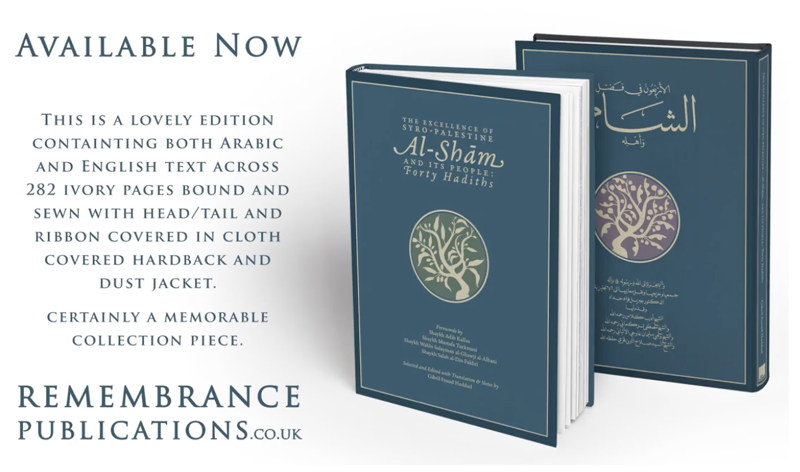 More info … [+]
More info … [+]
This is a beautiful book describing the virtues and blessings of the geographical land of al-Sham and the people that reside there, through 40 Hadiths, covering Topics: such as the descent of Our Master Isa (peace be upon him).
This was compiled and edited by the expert in hadith studies, Shaykh Gibril Fouad Haddad (one of the world’s leading masters on the science of hadith), who studied in Damascus for a number of years. Some of the luminaries of Damascus wrote forwards for this book.
 Merits of al-Shaam al-Sharif Shaykh Gibril Haddad
Merits of al-Shaam al-Sharif Shaykh Gibril Haddad
 YouTube Shaykh Gibril Haddad Speaking about The Excellence of Shaam
YouTube Shaykh Gibril Haddad Speaking about The Excellence of Shaam
Mawlana's Open Door in Johore and Singapore
Gibril Fouad Haddad, 2003
 PDF Mawlana's Open Door In Johore And Singapore
PDF Mawlana's Open Door In Johore And Singapore
More info … [+]
Topics: Sufism, Mawlid, Ahl al-Bayt, Tariqa, Naqshbandi, Ba Alawi, Habib Ali bin Jaafar Aydrus, Shaykh Zakariyya Ba Gharib
Travel notes of a 2003 journey to Malaysia and Singapore during the month of the Mawlid (birth of the Prophet Muhammad, upon him blessings and peace), Rabi` al-Awwal 1424, by the blessing of Mawlana Shaykh Nazim al-Haqqani and Mawlana Shaykh Hisham Kabbani, including special meetings with Sufi figures hailing from the family of the Prophet and the documentation of some of their beneficial words by Shaykh Gibril Fouad Haddad.
Related
 Mawlana's Open Door In Johore And Singapore Shaykh Gibril Fouad Haddad.
Mawlana's Open Door In Johore And Singapore Shaykh Gibril Fouad Haddad.
Qubrus al-Tarab fi Suhbati Rajab
The Joy of Cyprus in the Association of Rajab
قبرص الطرب بصحبة رجب
Discourses of Shaykh Nazim al-Haqqani
by Gibril Fouad Haddad, 2002
 PDF The Joy of Cyprus in the Association of Rajab
PDF The Joy of Cyprus in the Association of Rajab
More info … [+]
Topics: Sufism, Tasawwuf, Naqshbandiyya, Naqshbandi Tariqa
Sufi Discourses of Mawlana Shaykh Muhammad Nazim al-Haqqani (1922-2014) during the last two weeks of the Holy Month of Rajab 1422 (October 2001) in Lefke, Cyprus, narrated in Arabic and translated to English by Dr Gibril Fouad Haddad. Complete bilingual text as per the original edition and covers published in Damascus in 2002.
من ملفوظات العارف بالله مولانا الشيخ محمد ناظم النقشبندي الحقاني (1922-2014) رحمه الله تعالى في الأسبوعين الأخيرين من شهر رجب الحرام من سنة 1422 الموافق لتشرين الأوّل 2001 رواية د. جبريل فؤاد حداد مع الترجمة الانجليزية وهي طبعة مكتبة الأحباب بدمشق المحروسة.
Advice to Our Brethren the Scholars of Najd
(Nasiha li-Ikhwanina 'Ulama' Najd)
Yusuf Hashim Al-Rifa'i
Introduction by Muhammad Sa'id al-Buti
More info … [+]
Misbah al-Anam fi Radd Shubuhat al-Najdi al-Lati Adalla biha al-'Awamm
Habib Alawi Ibn Ahmad al-Haddad
Annotated translation by Gibril Fouad Haddad, 1999
 PDF Misbah al-Anam by Habib Alawi Ibn Ahmad al-Haddad
PDF Misbah al-Anam by Habib Alawi Ibn Ahmad al-Haddad
More info … [+]
Topics: Wahhabism, Islamic heresies, Islamic sects, heresiography, Muslim polemics, Islamic heresies, Muhammad ibn Abd al-Wahhab, Alawi ibn Ahmad al-Haddad
This is the English translation of the author's introduction to his Arabic book, مصباح الأنام وجلاء الظلام في رد شبه البدعي النجدي التي أضل بها العوام (The Lamp of Mankind and the Illumination of Darkness: Refutation of the Fallacies of the Najdi Innovator by which He Has Led Astray the Common People), one of the earliest rebuttals of the Wahhabi sect, written in 1216H/1801CE by the Shafi`i scholar Habib Alawi b. Ahmad al-Haddad of Tarim (Yemen), a contemporary of the founder of Wahhabism, Muhammad ibn `Abd al-Wahhab of Najd (1703-1792). The PDF of the original Arabic work, published in 1325/1907, is widely available online.
This annotated translation by Shaykh Gibril Fouad Haddad was originally published in Damascus in 1999 along with his translation of Sayyid Yusuf al-Rifa`i's book "Advice to Our Brethren the Scholars of Najd."
Sayyiduna Abu Bakr al-Siddiq radya Allahu 'anh.
From the Two Holy Sanctuaries: A Hajj Journal
With historical illustrations.
Gibril Fouad Haddad 2006
 PDF From The Two Holy Sanctuaries
PDF From The Two Holy Sanctuaries
More info … [+]
A visit at the Holy Sites of Mecca and Madina
Including the Chapters: Raised Graves and the Tomboclasts: Does Islam Condemn the Building of Tombs or the Preservation of Historical Vestiges?
And the Chapter: Disinformation in the Two Holy Sanctuaries
Topics: Muslim Pilgrimage, travelogue, Sunnism, Wahhabism, Muslim heresies, Mecca, Medina, Kaaba, Prophet Muhammad, Names of the Prophet, Ottomans, Sufism, Syria
While Hajj books are usually about the rituals of pilgrimage, few, if any, address the loss of voluntary spiritual practices that had been carried out for centuries in Mecca and Medina up until the time the Hajj was overseen by the Ottoman Sultans. In this personal account of his Hajj journey, the author laments the loss of the celebration and joy of visiting the Blessed Holy Prophet in Medina and the consequent impoverishment of grace that once accompanied the pilgrim in his heavenly journey to the House of the One God. Haddad’s hunt for blessings while on this sacred journey culminates with a chapter that addresses some of the most controversial Topics: that confront the pilgrims in the Two Holy Sanctuaries. Complemented by scholarly footnotes, this moving narrative revives the classical tradition that is missing more and more from modern texts and even rebuked when practiced, due to the formalism that now affects part of the Muslim world. From the Two Holy Sanctuaries will serve as an essential reference for anyone about to embark upon the Hajj wishing to connect themselves with the spirit of the early generations.
Taqriz for Dr. Afifi al-Akiti, 2007
Moonrises and the Meeting of Hearts
Concerning the Harmony between Islamic Jurisprudence and Astronomy and the Correlation of Computation and Sighting.
 PDF Moonrises and the Meeting of Hearts
PDF Moonrises and the Meeting of Hearts
More info … [+]
This work by Shaykh Muhammad Afifi al-Akiti, entitled Moonrises and the Meeting of Hearts, is the definitive reply on the seemingly absurd moonsighting controversy, which for many years has been a deplorable cause of discord and frustration for Muslims living in the West.
In this short, clinical examination on the question of moonsighting, Shaykh Afifi, who is firmly grounded in both the jurisprudential principles of Islamic Law and the astronomical sciences, elucidates the essential harmony between intellect and scripture, reason and revelation, science and Sacred Law, Islamic jurisprudence and modern astronomy.
Webpage for
Moonrises and the Meeting of Hearts, Hisab & Ru'ya or Matla' al-Budur
1a.7 At Muslim Academic Trust (MAT), Oxford
The Four Imams and Their Schools
Abu Hanifa, Malik, al-Shafi'i, Ahmad ibn Hanbal
Foreword by Sayyid Yusuf Hashim al-Rifa‘i
by Gibril Fouad Haddad, 2007
 PDF The Four Imams and Their Schools
PDF The Four Imams and Their Schools
More info … [+]
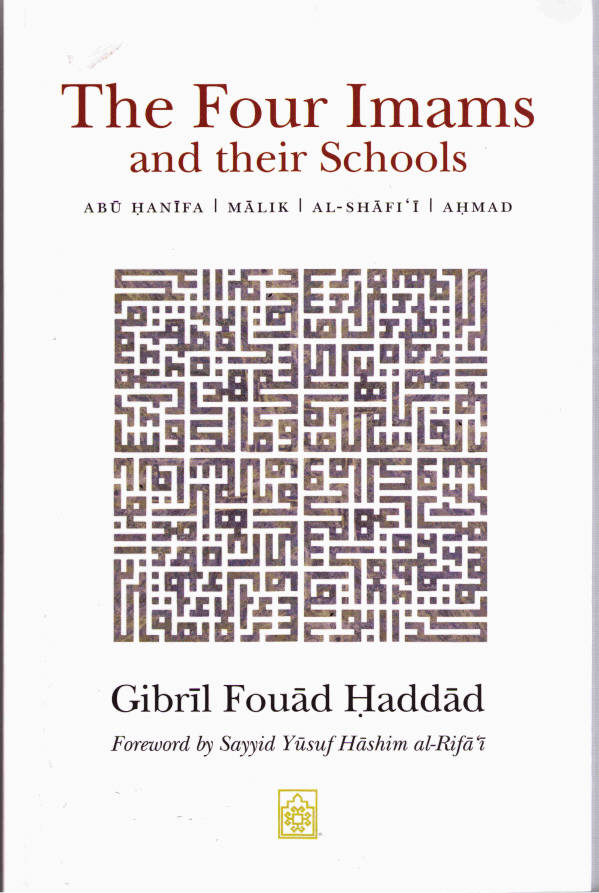
Paperback 551 Pages,
Muslim Academic Trust, London - at [
kitaabun.com]
The edition is in English with some Arabic.
Topics: Sunnism, Muslim Jurisprudence, Muslim Biographical History
The Great Edifice of Islamic Law is held up by four towering figures of
the early middle ages: Abu Hanifa, Malik, al-Shafi'i, and Ibn Hanbal.
Because of their immense dedication and intellectual acuity, these men
enjoy recognition to this day as Islam's most influential scholars.
By assessing and ranking hadith, by cultivating a deep knowledge of the Arabic language, and by virtue of their great native intelligence, they are credited with having shaped the development of the fundamental systems of Muslim jurisprudence, avoiding the twin pitfalls of subjective rationalism and blind literalism.
By doing so they not only protected their religion from chaos and disorder, but showed the Muslims, both ordinary and expert, the safest and most reliable ways of avoiding error in the understanding and practice of the divine law.
This detailed study offers biographies of these four men and their leading pupils. It surveys the distinctive features of their jurisprudence, and assesses their achievement.
An especially helpful feature is a long and detailed glossary of Islamic technical terms. Meticulously rooted in the core texts of Islamic scholarship, this book will be an important resource for Shari'ah students everywhere.
A historical overview of the methodology of the four founders of the schoolf of Sunni jurisprudence (Abu Hanifa, Shafi`i, Malik, Ahmad ibn Hanbal) including the emphasis they placed on understanding and practice of proof-texts over mere memorization and vested tradition; their embodiment of the Qur'an, Prophetic manners, simple living and remembrance of the One God that became known as sufism; their distate for theologizing beyond the necessity of explaining the creed; their affirmation of tolerance, generosity of spirit, and acceptance of divergent opinion which they understood as a mercy; and finally their division of innovation (bid‘a) as either good or bad.
About The Author
Dr. Gibril Fouad Haddad was born in Beirut in 1380/1960. He embraced Islam while a graduate student in French literature at Columbia University in New York. He lives in Damascus. Since 1997 he has published many translations of classical texts by the living masters of the past and present.
Recognised as one of the world’s leading authorities on Classical Islam Hadith and Shari'ah.
[ kitaabun.com]
Ibn 'Abd al-Salam's Doctrine of the People of Truth (al-Mulha fi I'tiqad Ahl al-Haqq).
Al-Bayhaqi's Divine Names and Attributes (al-Asma' wal-Sifat). Excerpts.
Ibn Khafif's Correct Islamic Doctrine. With Ibn 'Arabi's Doctrine of the Muslims.
The Muhammadan Light
in the Qur'an, Sunna, and Companion-Reports
From the Teachings of Mawlana al-Sayyid Shaykh Muhammad Nazim al-Haqqani and His Deputy al-Sayyid Shaykh Muhammad Hisham al-Kabbani
Gibril Fouad Haddad, 2012

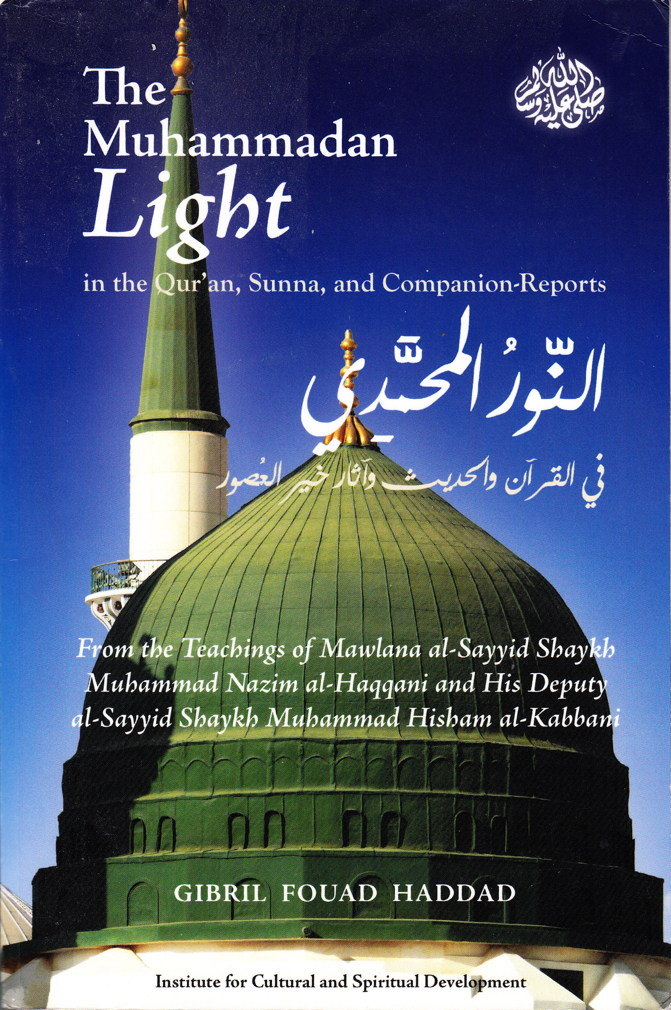
More info … [+]
200 verses of Quran and over 250 texts from the Prophet's biography (sira), his Attributes — (shama’il) and unique aspects (khasa'is), the spiricual poetry of the Companions and Awliya and commentary of the Quran and Hadith on the Light , of the Prophet Muhammad ﷺhis Inheritors.
When I beheld his lights shining out,
I placed in awe my hand before my eyes,
In fear for my sight at the beauty of his frame
and now I look at him only to my capacity.
His light has made all lights drown in his lights.
—Hassan b. Thabit
A disciple of Mawlana Shaykh Nazim al-Haqqani at the hands of his deputy Shaykh Hisham Kabbani for over two decades in the United States and Syria, Gibril Fouad Haddad holds scholarly licenses (ijaza) from 150 shaykhs and has authored three dozen books and hundreds of articles in Islamic hermeneutics, doctrine, hadith, biography and heresiology. He lives in Brunei Darussalam.
1a.10 At Dar al-A'tab, Jakarta (in Arabic):
Fayd al-Salam bi-Suhbat al-Shaykh Hisham wa-Minnat Mawlana al-Shaykh Nazim ala al-Khass wal-Amm.
- Incineration of Persons/ not yet online.
- Sulayman Ghawji. With Ibn Rajab's The Sunna of the Caliphs
- Revision, introduction, notes, and appendices for Miryam Poswal's translation of al-Suyuti's Sibahat al-Fikr fil-Jahri bil-Dhikr
Use button for YouTube search.


![]() PDF Encyclopedia Of Hadith Forgeries
PDF Encyclopedia Of Hadith Forgeries
![]() PDF Albani And His Friends
PDF Albani And His Friends
![]() PDF Mawlid: Celebrating the Birth of the Holy Prophet
PDF Mawlid: Celebrating the Birth of the Holy Prophet
![]() PDF The Prophet's Night Journey and Heavenly Ascent
PDF The Prophet's Night Journey and Heavenly Ascent![]() PDF The Refutation of Him Who Attributes Direction to Allah
PDF The Refutation of Him Who Attributes Direction to Allah
![]() PDF The Life of the Prophets in Their Graves
PDF The Life of the Prophets in Their Graves
![]() Fatwa Against The Targeting Of Civilians
Fatwa Against The Targeting Of Civilians![]() PDF Sunna Notes I - III
PDF Sunna Notes I - III![]() PDF Sunna Notes I - III
PDF Sunna Notes I - III![]() PDF Sunna Notes I - III
PDF Sunna Notes I - III
![]() PDF Mawlana's Open Door In Johore And Singapore
PDF Mawlana's Open Door In Johore And Singapore![]() PDF The Joy of Cyprus in the Association of Rajab
PDF The Joy of Cyprus in the Association of Rajab
![]() PDF Misbah al-Anam by Habib Alawi Ibn Ahmad al-Haddad
PDF Misbah al-Anam by Habib Alawi Ibn Ahmad al-Haddad
![]() PDF From The Two Holy Sanctuaries
PDF From The Two Holy Sanctuaries![]() PDF Moonrises and the Meeting of Hearts
PDF Moonrises and the Meeting of Hearts![]() PDF The Four Imams and Their Schools
PDF The Four Imams and Their Schools
![]() PDF al-aadaab-al-mardiyya
PDF al-aadaab-al-mardiyya
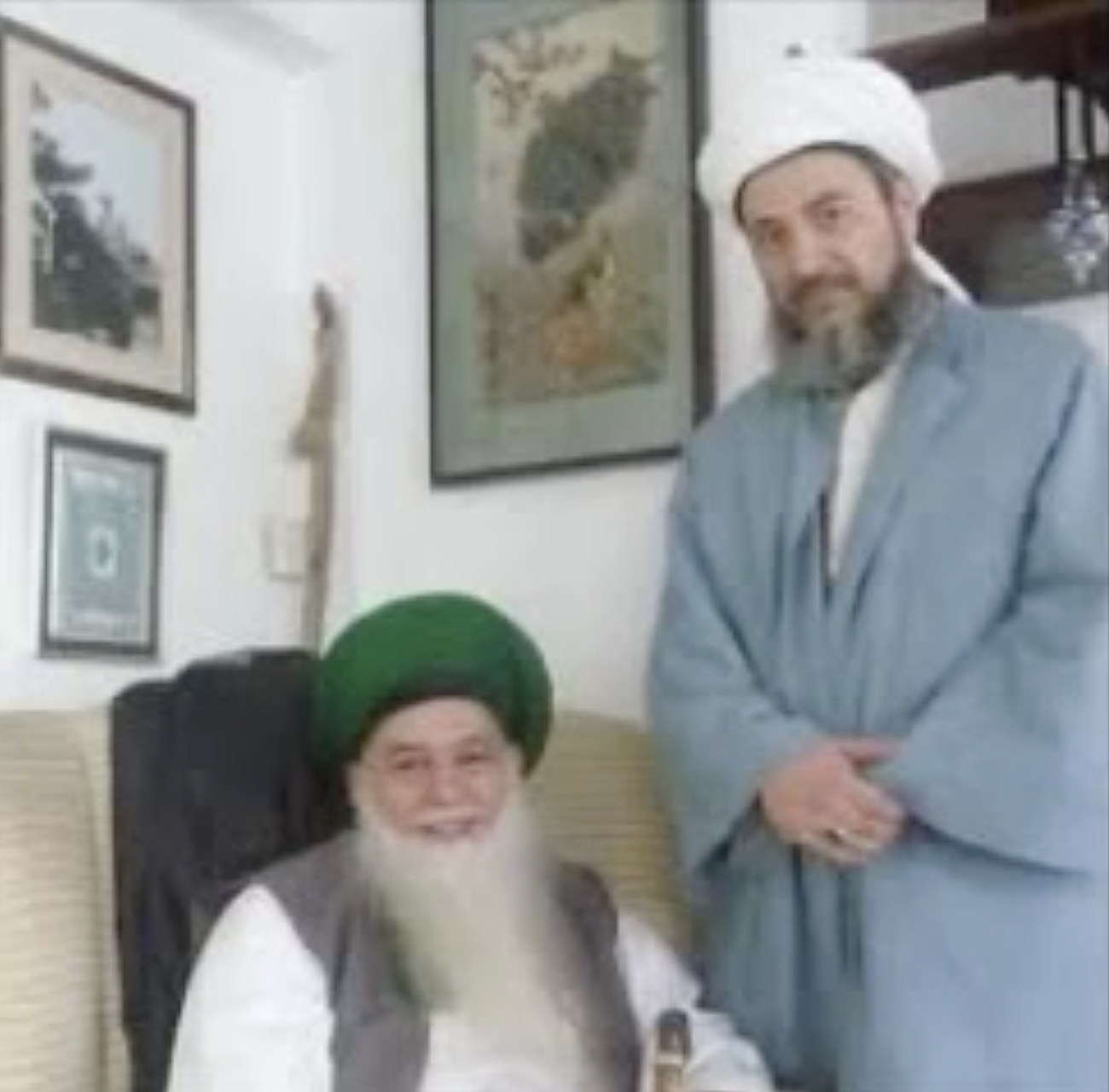




![]() [Hadith]
[Hadith]